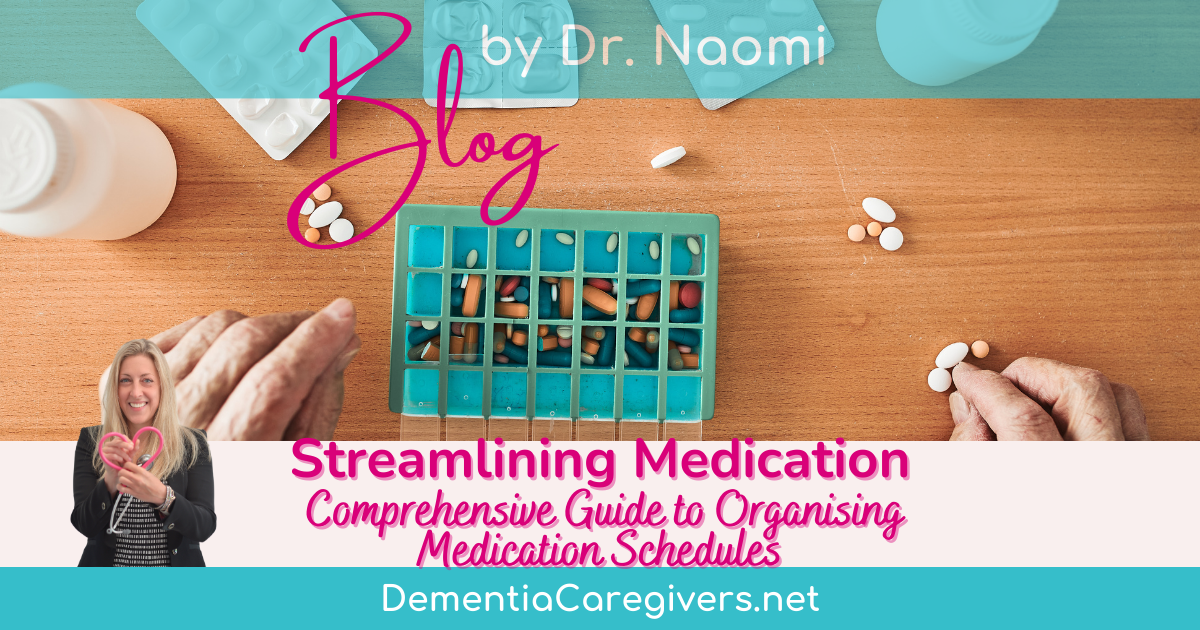
Caring for a loved one with dementia comes with its own set of unique challenges. Among these, medication management can often be a complex and overwhelming task. Keeping track of numerous prescriptions, dosages, and schedules can feel like a full-time job. But fear not, there's a solution – organising medication schedules effectively.
This comprehensive blog will delve deep into the importance of creating an organised medication schedule for your loved one. We'll provide you with practical tips and strategies to make this crucial caregiving aspect more manageable. By establishing a clear routine and setting up effective medication reminders, you can significantly reduce the risk of missed doses and ensure your loved one's health remains a top priority.
The Significance of Medication Management
Before we dive into the details of organising medication schedules, let's take a moment to understand why it's such a critical aspect of dementia caregiving.
Health and Well-being
Medications and supplements can play a pivotal role in managing the symptoms and progression of dementia. Proper medication management can help stabilise cognitive function, alleviate behavioural issues, and improve overall well-being.
Safety
Mismanagement of medications can lead to serious health risks, including adverse reactions, hospitalisations, and even life-threatening situations. A well-organized schedule reduces these risks significantly.
Peace of Mind
When you have a reliable medication schedule in place, you can have greater peace of mind knowing that your loved one is receiving the necessary treatments as prescribed.
Now, let's move on to the practical steps for organising medication schedules.
Creating a Clear Medication Schedule
Step 1: Consult with Healthcare Professionals
The first step in establishing an organised medication schedule is to consult with your loved one's healthcare team. Ensure you comprehensively understand each medication, including its purpose, dosage, and any potential side effects.
Step 2: Use a Medication Tracking Tool
Consider using a medication tracking tool, such as a pill organiser or a medication management app. These tools can help you visually organise medications by day and time, making it easier to keep track of doses.
Step 3: Create a Medication Chart
Design a medication chart that outlines the medication schedule for each day. Include the name of each medication, the dosage, and the specific time it should be taken. Keep this chart easily accessible for reference.

Setting Up Medication Reminders
Step 4: Alarm Clocks and Timers
Set up alarms or timers on your loved one's phone or a dedicated device. Program these alarms to go off at the exact times when medications should be taken. This serves as a reliable auditory reminder.
Step 5: Medication Reminder Apps
Explore medication reminder apps available for smartphones and tablets. These apps often come with customisable features, allowing you to input medication details and receive timely reminders.
Step 6: Enlist the Help of a Caregiver
Establish clear communication regarding medication schedules if you have a caregiver or nurse assisting with your loved one's care. Ensure they are well-informed about the routines and reminders.

Reducing the Risk of Missed Doses
Step 7: Weekly Medication Preparations
Designate a specific day of the week for medication preparations. During this time, organise medications for the upcoming week. Fill pill organisers or create daily medication packs for easy access.
Step 8: Medication Review
Regularly review your loved one's medication list with their healthcare provider. This helps ensure that the prescribed medications remain appropriate and effective.
Step 9: Emergency Medication Plan
Have an emergency medication plan in place. This should include instructions for caregivers or family members on what to do if a dose is missed or if there are any issues with medication administration.
Conclusion
Organising medication schedules may initially seem daunting, but with the right approach, it becomes an integral part of providing effective dementia care. Following the steps outlined in this guide, you can simplify the process and reduce the risk of missed doses, ultimately enhancing your loved one's health and well-being.
Remember, you're not alone in this journey. Seek support from healthcare professionals, caregivers, and support groups who can provide guidance and assistance. And if you ever need help or have questions about medication management, don't hesitate to reach out. I can assist you with medication reviews and offer guidance to ensure your loved one's health remains a top priority.
Love what you read here? Subscribe for updates! Add me to the list!



























0 Comments